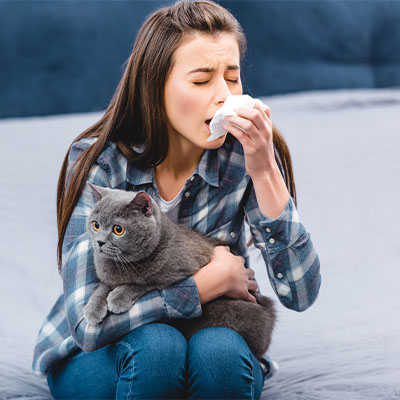Allergy Attacks
Allergy Attacks
An allergy attack occurs when your immune system overreacts to a substance like pollen, bee venom, pet dander, a particular food, or something that does not cause a reaction in most people. Your immune system feels threatened by a harmless substance, perceiving the substance as a foreign, dangerous invader.
When your immune system feels threatened, it reacts by producing substances known as antibodies that attack the “invader.” These antibodies, in turn, release chemicals such as histamine that can inflame your sinuses, airways, skin, or your digestive system.
The severity of an allergy ranges from minor irritation to anaphylaxis, a potentially life-threatening emergency.
While most allergies cannot be cured, treatments can help relieve symptoms.

A common seasonal allergy is hay fever. Also called allergic rhinitis, hay fever can cause:
- Sneezing
- Itching of the nose, eyes, or roof of the mouth
- Runny, stuffy nose
- Watery, red, or swollen eyes (conjunctivitis)
Food allergies can cause:
- Tingling in the mouth
- Swelling of the lips, tongue, face, or throat
- Hives
- Anaphylaxis
An insect sting allergy can cause:
- A large area of swelling (edema) at the sting site
- Itching or hives all over the body
- Cough, chest tightness, wheezing, or shortness of breath
- Anaphylaxis
A drug allergy can cause:
- Hives
- Itchy skin
- Rash
- Facial swelling
- Wheezing
- Anaphylaxis
An allergic skin condition (eczema) can cause the skin to:
- Itch
- Redden
- Flake or peel
- Anaphylaxis
What is Anaphylaxis:
Some allergies, including insect allergy stings and food allergies, can trigger a severe reaction known as anaphylaxis. Anaphylaxis is a life-threatening medical emergency that causes the body to go into shock.
Signs and symptoms of anaphylaxis include:
- Loss of consciousness
- A drop in blood pressure
- Severe shortness of breath
- Skin rash
- Lightheadedness
- A rapid, weak pulse
- Nausea and vomiting
If you experience a severe allergic reaction seek emergency medical help at your closest emergency room or call 911. If you carry an epinephrine auto-injector (EpiPen), give yourself a shot immediately and then proceed to the emergency room. Emergency room attention is imperative after an auto-injection shot for close monitoring of the shot’s effect and to make sure your symptoms do not return after the effects of the injection wear off.
If you have had a severe allergy attack or any signs and symptoms of anaphylaxis in the past, your primary care provider needs to know. Your primary care provider or a specialist in allergies and immunology will put a long-term management plan in place.
Moderate Allergic Reactions
If you experience moderate, unpleasant, and persistent allergic reactions, talk to your primary care provider about allergy testing, immunotherapy, and other options to better understand and address your symptoms.
Over-the-counter medication can often provide relief for mild seasonal allergies, as can air filters and trigger avoidance. Talk to your provider to decide what treatment plan would be best for your particular allergy.
The following are common allergy triggers:
- Airborne allergens, including pollen, animal dander, dust mites, and mold
- Certain foods, particularly peanuts, tree nuts, wheat, soy, fish, shellfish, eggs, and milk
- Insect stings or bites, including bee, wasp, or fire ants
- Medications, particularly penicillin or penicillin-based antibiotics
- Latex or other substances that cause allergic skin reactions
Risk factors for developing allergies include:
- Family history of asthma and allergies, such as hay fever, hives, or eczema
- Existing asthma or other allergic conditions that put you at greater risk for developing new allergies
Prevention depends on the type of allergy you have
General measures include:
- Avoid known triggers as best as you can, such as staying inside when pollen is high
- Keep the inside of your home free of dust, and wash bed sheets regularly
- Keep a diary to help identify triggers and conditions that worsen allergies
- Talk to your primary care provider to see if testing and immunotherapy might make sense
